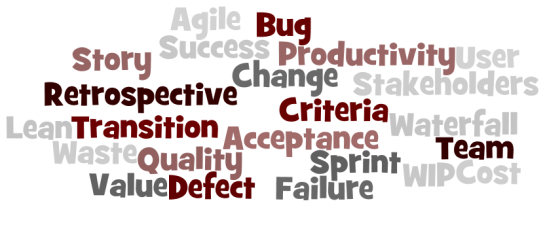A Vocabulary for the Antimatter Principle
For me, one key aspect of the Antimatter Principle is the different – and, to my mind much simpler – frame it provides for looking at work, and the perennial challenges of coordination, prioritisation, allocation, communication, motivation, and so on.
“Words are, of course, the most powerful drug used by mankind.”
~ Rudyard Kipling
To illustrate this new frame, here are some common words, expressed through the Antimatter Principle’s frame:
- Success: Meeting folks’ needs, in aggregate, i.e. without undermining other folks’ needs.
- Failure: Not meeting folks’ needs, in aggregate, i.e. not meeting folks’ needs without undermining some other folks’ needs.
- Cost: The degree to which some folks’ needs are sacrificed, or allowed to go unmet, so as to meet the needs of some other folks.
- Productivity: The ratio of “folks’ needs met” to “folks’ needs sacrificed”.
- Performance: The relative impact on all the needs of all The Folks That Matter™, of meeting the needs of all The Folks That Matter™
- Effectiveness: See: Performance.
- Stakeholders: Those folks whose needs we’re specifically attending to, i.e. The Folks That Matter™
- Value: The degree to which folks’ needs, in aggregate, are being (or have been) met.
- Worth: How folks feel about having a need attended to.
- Quality: The degree to which some specific person’s needs are being (or have been) met.
- Defect: Anything that is supposed to meet a need, that in fact does not meet that need.
- Change: Adopting different approaches to attending folks’ needs.
- Waste: Sacrificing folks’ needs – without meeting (other) folks’ needs.
- Demand: Folks’ needs inviting attention.
- Failure Demand: See: Waste.
- Agile: One particular (interlocking, internally self-consistent) set of strategies for attending to folks’ needs.
- Lean: Another (interlocking, internally self-consistent) set of strategies for attending to folks’ needs.
- Waterfall: Yet another (interlocking, internally self-consistent) set of strategies for attending to folks’ needs.
- Transition: A wholesale and widespread replacement of one set of strategies for attending to folks’ needs with another such set.
- Acceptance Criteria: A list of folks’ needs which we’re aiming to attend to.
- Bug aka Defect: A need that we thought we’d attended to already, that is presently not met.
- Retrospective: Taking a look at the strategies presently being used to attend to folks’ needs.
- Sprint: A time period during which we attend to a selected (sub)set of folks’ needs.
- Status Quo: The use of default or habitual strategies for attending to folks’ needs.
- Team: Some folks aligned (in principle) on attending to some folks’ needs.
- User Story: A small, self-contained set of related needs.
- WIP: The needs we’re presently in the process of attempting to meet.
Are there any other words or terms you’d like to see added to this list?
“Words are loaded pistols.”
~ Jean-Paul Sartre
– Bob


